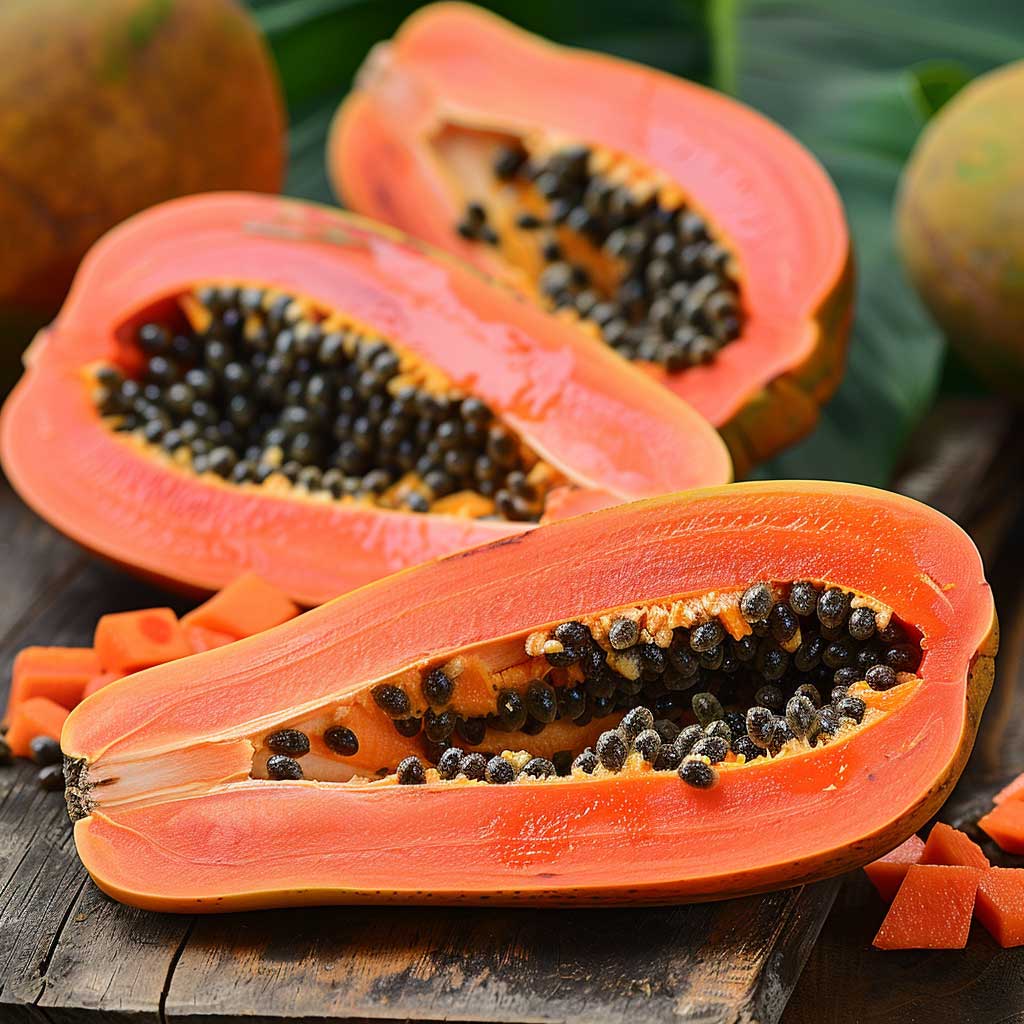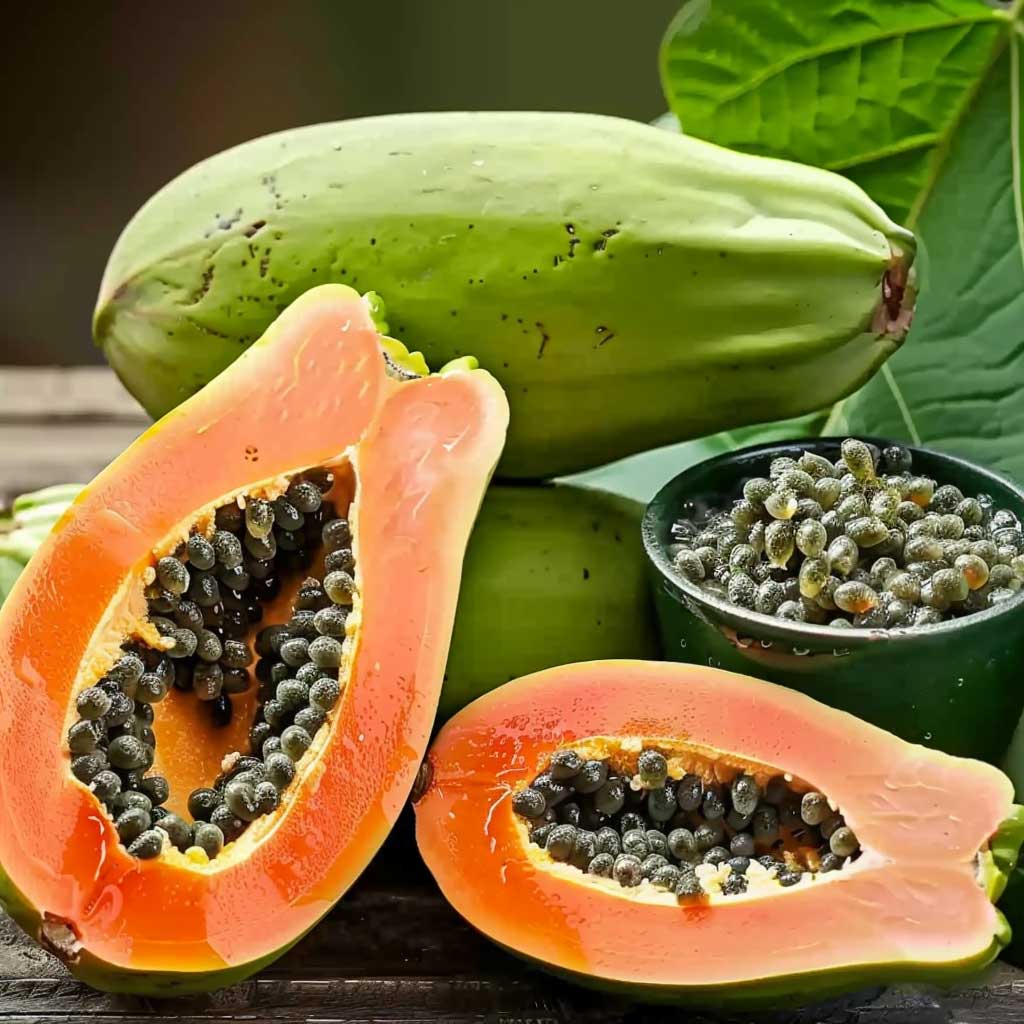The scientific name of the orange and green fruit commonly known as papaya is Carica papaya. It is appreciated for its sweet taste and soft texture. The seeds, though edible, have a more bitter flavor compared to the fruit.
The scientific name of the orange and green fruit commonly known as papaya is Carica papaya. It is appreciated for its sweet taste and soft texture. The seeds, though edible, have a more bitter flavor compared to the fruit.
Quick facts about papaya:
Papaya originates from Mexico but is also found growing naturally in the Caribbean and Florida.
India leads global papaya production, yielding over 5 million tons in 2013 according to the Food and Agriculture Organization of the United Nations (FAO).
Eye Health and Vision

Certain organic compounds found in papaya may aid in preventing inflammation and oxidative stress associated with age-related eye diseases like macular degeneration.
Among these compounds is lycopene, which could safeguard the retinal pigment epithelium — crucial for maintaining healthy vision — from inflammation and oxidative stress.
Papaya’s rich content of carotene, responsible for its distinctive orange hue, is linked to improved vision and the prevention of night blindness.
Additionally, zeaxanthin, an antioxidant present in papaya, helps filter harmful blue light rays, potentially protecting eye health and reducing the risk of macular degeneration.
Asthma:

Consuming a rich variety of fruits and vegetables reduces the risk of asthma development and can help mitigate its severity.
This benefit is attributed to dietary components found in fruits and vegetables, such as antioxidants, fiber, and vitamin D, which support the immune system’s balanced response, particularly in individuals prone to asthma.
A recent study in 2022 also associated higher intake of carotenes, lycopene, and zeaxanthin with a reduced risk of asthma among adults. Papaya contains all three of these beneficial compounds.
Additionally, a 2017 animal study demonstrated that papaya leaf extract has anti-inflammatory properties in the airways of mice. However, further research is needed to understand its potential impact on humans.
Cancer

Several compounds found in papaya, such as lycopene, zeaxanthin, and lutein, are believed to possess anticancer properties.
According to a 2022 review, lycopene has shown potential anticancer effects, particularly in studies focusing on prostate cancer. However, further research is needed to establish recommended dosage levels.
A 2020 study indicated that zeaxanthin might offer beneficial effects against gastric cancer cells.
Additionally, a 2018 study found that lutein selectively inhibits the growth of breast cancer cells.
Furthermore, adopting a diet rich in fruits and vegetables, particularly those vibrant in color like dark green, yellow, red, and orange, is associated with a reduced risk of cancer in general.
Bone health:
Papaya contains vitamin K, which is essential for maintaining strong bones. Insufficient intake of vitamin K has been linked to an increased risk of bone fractures.
Adequate consumption of vitamin K is crucial for overall health. It enhances calcium absorption and may decrease the urinary excretion of calcium, thereby promoting stronger bones and supporting bone rebuilding processes.

Diabetes:
Research indicates that individuals with type 1 diabetes who consume diets high in fiber experience lower blood glucose levels. Similarly, those with type 2 diabetes may see improvements in blood sugar, lipid profiles, and insulin levels with high fiber diets.
A small papaya offers nearly 3 grams of fiber and contains just 17 grams of carbohydrates.
Digestion:
Papaya’s high fiber and water content support digestive health by preventing constipation and promoting regularity in the digestive tract.
Heart disease:
Antioxidants like lycopene found in papaya may lower the risk of heart disease and stroke. Papaya’s fiber content is also linked to cholesterol reduction, while its high potassium levels are beneficial for individuals managing high blood pressure.
Boosting potassium intake while reducing sodium intake is crucial dietary advice to mitigate cardiovascular disease risk.

Hair health:
Papaya is beneficial for hair health due to its vitamin A content, which supports sebum production to keep hair moisturized. Vitamin A is essential for the growth of all body tissues, including skin and hair.
Additionally, papaya provides vitamin C, crucial for collagen synthesis, essential in maintaining skin structure and elasticity.
Nutritional Profile of Papaya:
Papayas are rich in vitamin C, with one small fruit providing about 95.6 milligrams, exceeding the daily recommended intake for both adult males (90 mg) and females (75 mg).
A medium-sized papaya contains approximately:
- 120 calories
- 30 grams of carbohydrates, including 5 grams of fiber and 18 grams of sugar
- 2 grams of protein
Papayas are also a good source of:
- Folate
- Vitamin A
- Magnesium
- Copper
- Pantothenic acid
They are rich in B vitamins, alpha and beta-carotene, lutein, zeaxanthin, vitamin E, calcium, potassium, vitamin K, and lycopene, a potent antioxidant commonly found in tomatoes.
